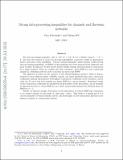Strong Data-Processing Inequalities for Channels and Bayesian Networks
Author(s)
Polyanskiy, Yury; Wu, Yihong
DownloadAccepted version (392.1Kb)
Open Access Policy
Open Access Policy
Creative Commons Attribution-Noncommercial-Share Alike
Terms of use
Metadata
Show full item recordAbstract
The data-processing inequality, that is, I(U; Y ) ≤ I(U; X) for a Markov chain U → X → Y, has been the method of choice for proving impossibility (converse) results in information theory and many other disciplines. Various channel-dependent improvements (called strong data-processing inequalities, or SDPIs) of this inequality have been proposed both classically and more recently. In this note we first survey known results relating various notions of contraction for a single channel. Then we consider the basic extension: given SDPI for each constituent channel in a Bayesian network, how to produce an end-to-end SDPI?
Our approach is based on the (extract of the) Evans-Schulman method, which is demonstrated for three different kinds of SDPIs, namely, the usual Ahlswede-Gács type contraction coefficients (mutual information), Dobrushin’s contraction coefficients (total variation), and finally the F I -curve (the best possible non-linear SDPI for a given channel). Resulting bounds on the contraction coefficients are interpreted as probability of site percolation. As an example, we demonstrate how to obtain SDPI for an n-letter memoryless channel with feedback given an SDPI for n = 1.
Finally, we discuss a simple observation on the equivalence of a linear SDPI and comparison to an erasure channel (in the sense of “less noisy” order). This leads to a simple proof of a curious inequality of Samorodnitsky (2015), and sheds light on how information spreads in the subsets of inputs of a memoryless channel.
Description
Part of the The IMA Volumes in Mathematics and its Applications book series (IMA, volume 161).
Date issued
2017-04Department
Massachusetts Institute of Technology. Department of Electrical Engineering and Computer ScienceJournal
Convexity and Concentration
Publisher
Springer
Citation
Polyanskiy, Yury and Yihong Wu. "Strong Data-Processing Inequalities for Channels and Bayesian Networks." Convexity and Concentration, IMA Volumes in Mathematics and its Applications, 161, Springer, 2017, 211-249. © 2017 Springer Science+Business Media LLC
Version: Author's final manuscript
ISBN
9781493970049
9781493970056
ISSN
0940-6573
2198-3224